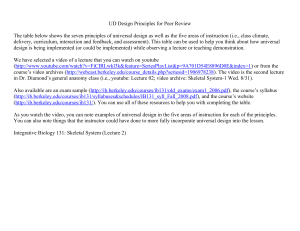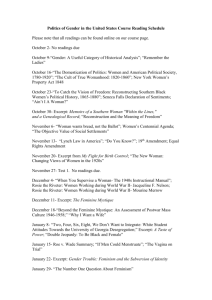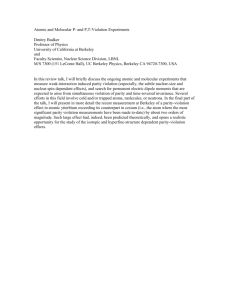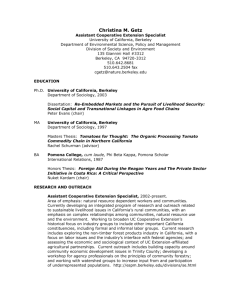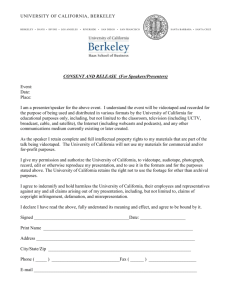Anthropology 625 - University of Pennsylvania School of Medicine
advertisement
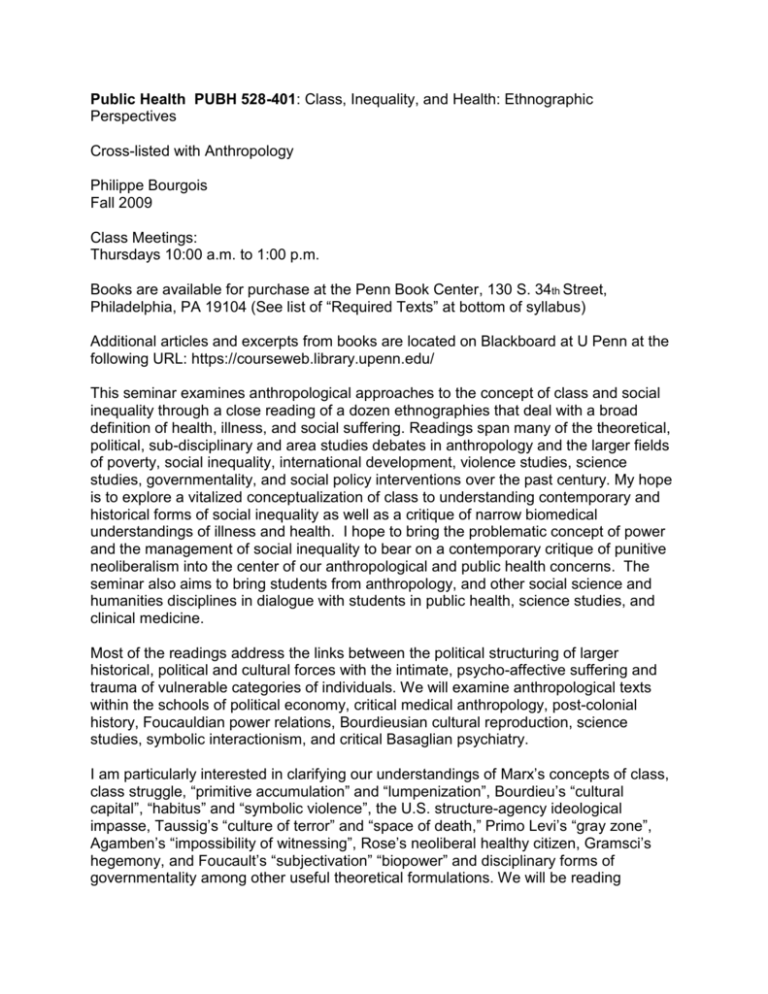
Public Health PUBH 528-401: Class, Inequality, and Health: Ethnographic Perspectives Cross-listed with Anthropology Philippe Bourgois Fall 2009 Class Meetings: Thursdays 10:00 a.m. to 1:00 p.m. Books are available for purchase at the Penn Book Center, 130 S. 34th Street, Philadelphia, PA 19104 (See list of “Required Texts” at bottom of syllabus) Additional articles and excerpts from books are located on Blackboard at U Penn at the following URL: https://courseweb.library.upenn.edu/ This seminar examines anthropological approaches to the concept of class and social inequality through a close reading of a dozen ethnographies that deal with a broad definition of health, illness, and social suffering. Readings span many of the theoretical, political, sub-disciplinary and area studies debates in anthropology and the larger fields of poverty, social inequality, international development, violence studies, science studies, governmentality, and social policy interventions over the past century. My hope is to explore a vitalized conceptualization of class to understanding contemporary and historical forms of social inequality as well as a critique of narrow biomedical understandings of illness and health. I hope to bring the problematic concept of power and the management of social inequality to bear on a contemporary critique of punitive neoliberalism into the center of our anthropological and public health concerns. The seminar also aims to bring students from anthropology, and other social science and humanities disciplines in dialogue with students in public health, science studies, and clinical medicine. Most of the readings address the links between the political structuring of larger historical, political and cultural forces with the intimate, psycho-affective suffering and trauma of vulnerable categories of individuals. We will examine anthropological texts within the schools of political economy, critical medical anthropology, post-colonial history, Foucauldian power relations, Bourdieusian cultural reproduction, science studies, symbolic interactionism, and critical Basaglian psychiatry. I am particularly interested in clarifying our understandings of Marx’s concepts of class, class struggle, “primitive accumulation” and “lumpenization”, Bourdieu’s “cultural capital”, “habitus” and “symbolic violence”, the U.S. structure-agency ideological impasse, Taussig’s “culture of terror” and “space of death,” Primo Levi’s “gray zone”, Agamben’s “impossibility of witnessing”, Rose’s neoliberal healthy citizen, Gramsci’s hegemony, and Foucault’s “subjectivation” “biopower” and disciplinary forms of governmentality among other useful theoretical formulations. We will be reading primarily ethnographies based on participant-observation methods that engage various schools of critical social science theory. We will also explore the contrasts between anthropological vs. literary vs. testimonial vs. political journalistic vs. epidemiological approaches to the topics. Requirements: I: Readings and Presentations In addition to preparing for class discussions and to reading one ethnography per week, students are responsible for making at least one 15 minute presentation (that will require extra reading) to situate the theoretical debates/critiques and/or background context of a particular week’s ethnography. [Depending on the number of students, seminar participants will be divided alphabetically into reading groups. Each week one of the four reading groups will be responsible for co-leading the discussion and presenting relevant background context for the readings. The reading group will meet independently at least once to decide on the themes they would like to discuss and present.] Readings and potential “theoretical context presentation themes” are offered in brackets below the reading for each week: (Please feel free to provide feedback for potential changes in readings and to suggest alternative theoretical context presentations.) Short reaction papers: Students must submit a minimum of four (3 to 5 page) critical reaction papers responding to the ethnography for that week. These should be more than a summary. They should engage with one or more of the central arguments of the text. Reaction papers must be posted on blackboard by noon on the Sunday prior to the Monday afternoon seminar meeting so that all students can read them in advance of class and so that they can inform our class discussion. A final paper (10-12 pages + bib.) is due Monday, November 18. It can be based on either: a) Original research/literature review of one of the approaches to social inequality and classfields of urban poverty and violence b) Rough draft of a graduate student field statement – bibliographical essay on violence c) A theoretically informed local ethnographic project Week 1, September 14: Introduction: Student interests, outline of the course, theoretical logic of the readings, other logistics. Excerpt from Engels, Friedrich 1993 [1845] The Condition of the Working Class in England. Oxford: Oxford University Press. ONLY Chapter 5 “Results” pp. 106-143. (Available on Blackboard.) Excerpt from Capital or other Marx text, especially text on primitive accumulation or general law of capitalist accumulation. Week 2, September 21: 2 Harvey, David. A Brief History of Neoliberalism. (especially chapters 1,3,4,6) Week 3, September 28: Fassin, Didier 2007 When bodies remember: experiences and politics of AIDS in South Africa. Berkeley: University of California Press. Week 4, October 5: Farmer, Paul 1992 AIDS and accusation: Haiti and the geography of blame. Berkeley: University of California Press. Week 5, October 12: Petryna, Adriana 2002 Life Exposed: Biological Citizens After Chernobyl. Princeton: Princeton University Press. Week 6, October 26: Fanon, Franz Wretched of the Earth especially Appendix Week 7, November 2: Bourgois, Philippe, and Jeff Schonberg 2009 Righteous dopefiend. Berkeley: University of California Press. Bourdieu, Pierre 2000. Pascalian Meditations. Read ONLY Postscript I “Impersonal Confessions” pp. 33-42, Chapters 4-6 “Bodily Knowledge” and “Symbolic Violence and Political Struggles” and “Social Being, Time and Sense of Existence” pp. 128-245. (Available on Blackboard.) Wacquant, Loïc 2004. “Habitus” In International Encyclopedia of Economic Sociology. London: Routledge Milan Zafirovski Ed. (Available on Blackboard.) Bourdieu and Wacquant “Symbolic Violence” Chapter 32 IN Violence in War and Peace… pp. 272-274. Week 8, November 9: Taussig, Michael T. 1986 Shamanism, colonialism, and the wild man: a study in terror and healing. Chicago: University of Chicago Press. Foucault “Right to Death…” Ch 7 IN Violence in War and Peace pp 79-82. Week 9, November 16: 3 Goffman, Erving 1961 Asylums; essays on the social situation of mental patients and other inmates. Garden City, N.Y.: Anchor Books. (First two essays) Histories on confinement, excerpts from Foucault or Scull Week 10, November 23: Scheper-Hughes, Nancy M. 1977 Saints, scholars and schizophrenics: Mental illness and Irish culture, U California, Berkeley. Basaglia excerpt. Week 11, November 30: Rhodes, Lorna A. 2004 Total Confinement: Madness and Reason in the Maximum Security Prisons. Berkeley: University of California Press. Excerpt from Discipline and Punish or Madness and Civilization. Week 12, December 7: Women's Health in Post-Soviet Russia: The Politics Of Intervention, Michele Rivkin-Fish Excerpt from Nikolas Rose Excerpt from Liberation Theology Required Texts: Harvey, David. A Brief History of Neoliberalism. (especially chapters 1,3,4,6) Fassin, Didier 2007 When bodies remember: experiences and politics of AIDS in South Africa. Berkeley: University of California Press. Farmer, Paul 1992 AIDS and accusation: Haiti and the geography of blame. Berkeley: University of California Press. Petryna, Adriana 2002 Life Exposed: Biological Citizens After Chernobyl. Princeton: Princeton University Press. Bourgois, Philippe, and Jeff Schonberg 2009 Righteous dopefiend. Berkeley: University of California Press. 4 Taussig, Michael T. 1986 Shamanism, colonialism, and the wild man: a study in terror and healing. Chicago: University of Chicago Press. Goffman, Erving 1961 Asylums; essays on the social situation of mental patients and other inmates. Garden City, N.Y.: Anchor Books. Scheper-Hughes, Nancy M. 1977 Saints, scholars and schizophrenics: Mental illness and Irish culture, U California, Berkeley. Rhodes, Lorna A. 2004 Total Confinement: Madness and Reason in the Maximum Security Prisons. Berkeley: University of California Press. Biehl, Joao. 2005. Vita: Life in a Zone of Social Abandonment. Berkeley: University of California Press. 5



